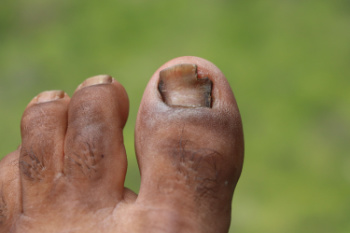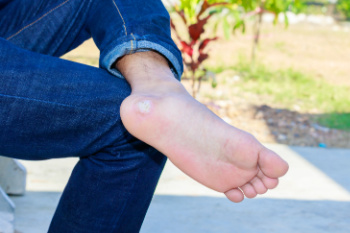Connect With Us
Blog

Heel pain in children is a common complaint that can stem from several causes, often related to growth and physical activity. Sever's disease is one of the most frequent sources, involving inflammation of the growth plate in the heel due to repetitive stress or impact during sports. Plantar fasciitis can also develop when the thick tissue that supports the arch becomes irritated, causing discomfort in the heel, especially after rest. Achilles tendinitis results from overuse of the tendon that connects the calf muscles to the heel, leading to pain and stiffness. In more serious cases, a fracture may be the cause, often from a fall or direct impact. If your child has heel pain, it is suggested that you promptly schedule an appointment with a podiatrist.
Making sure that your children maintain good foot health is very important as they grow. If you have any questions, contact one of our doctors of Advanced Podiatry. Our doctors can provide the care you need to keep you pain-free and on your feet.
Keeping Children's Feet Healthy
Having healthy feet during childhood can help prevent medical problems later in life, namely in the back and legs. As children grow, their feet require different types of care. Here are some things to consider...
Although babies do not walk yet, it is still very important to take care of their feet.
Avoid putting tight shoes or socks on his or her feet.
Allow the baby to stretch and kick his or her feet to feel comfortable.
As a toddler, kids are now on the move and begin to develop differently. At this age, toddlers are getting a feel for walking, so don’t be alarmed if your toddler is unsteady or ‘walks funny’.
As your child gets older, it is important to teach them how to take care of their feet.
Show them proper hygiene to prevent infections such as fungus.
Be watchful for any pain or injury.
Have all injuries checked by a doctor as soon as possible.
Comfortable, protective shoes should always be worn, especially at play.
If you have any questions please feel free to contact our offices located in Needham, Norwood, and Hanover, MA . We offer the newest diagnostic and treatment technologies for all your foot and ankle needs.

Athletes are more likely to develop onychomycosis, a fungal infection of the toenails. Constant sweating, wearing tight shoes, and exposure to communal areas like locker rooms create an ideal environment for fungus to thrive. Repetitive trauma to the toenails from running or sporting activity can also make nails more vulnerable to infection. Early signs include discoloration, thickening, and crumbling of the nail. If left untreated, onychomycosis can cause pain, make wearing shoes difficult, and even lead to secondary bacterial infections. Treatment often involves topical antifungal medications, oral prescriptions, or laser therapy. Athletes can help prevent onychomycosis by keeping their feet clean and dry, changing socks regularly, wearing breathable shoes, and using shower shoes in public areas. If you notice changes in your toenails, it is suggested that you see a podiatrist for diagnosis and appropriate treatment.
For more information about treatment, contact one of our doctors of Advanced Podiatry. Our doctors can provide the care you need to keep you pain-free and on your feet.
Toenail Fungus Treatment
Toenail fungus is a condition that affects many people and can be especially hard to get rid of. Fortunately, there are several methods to go about treating and avoiding it.
Antifungals & Deterrence
Oral antifungal medicine has been shown to be effective in many cases. It is important to consult with a podiatrist to determine the proper regiment for you, or potentially explore other options.
Applying foot powder on the feet and shoes helps keep the feet free of moisture and sweat.
Sandals or open toed shoes – Wearing these will allow air movement and help keep feet dry. They also expose your feet to light, which fungus cannot tolerate. Socks with moisture wicking material also help as well.
If you have any questions please feel free to contact our offices located in Needham, Norwood, and Hanover, MA . We offer the newest diagnostic tools and technology to treat your foot and ankle needs.

Plantar warts are small growths that develop on the soles of your feet. They are caused by the human papillomavirus, or HPV, which enters the skin through tiny cuts or breaks in the skin. While often harmless, plantar warts can become painful, especially when located on weight-bearing areas like the heel or ball of the foot. Walking can feel like you’re stepping on a pebble, and over time, the pressure may cause the wart to grow inward beneath thick layers of skin. Mild treatments do not always work and can take months to show results. A podiatrist offers more effective options, including cryotherapy, or freezing, as well as topical acids, or minor surgical removal. Early treatment not only relieves discomfort but also helps prevent the wart from spreading to other areas or people. If you suspect you have a plantar wart and it is not improving, it is suggested that you schedule an appointment with a podiatrist for proper diagnosis and appropriate treatment.
Plantar warts can be very uncomfortable. If you need your feet checked, contact one of our doctors from Advanced Podiatry. Our doctors will assist you with all of your foot and ankle needs.
About Plantar Warts
Plantar warts are the result of HPV, or human papillomavirus, getting into open wounds on the feet. They are mostly found on the heels or balls of the feet.
While plantar warts are generally harmless, those experiencing excessive pain or those suffering from diabetes or a compromised immune system require immediate medical care. Plantar warts are easily diagnosed, usually through scraping off a bit of rough skin or by getting a biopsy.
Symptoms
- Lesions on the bottom of your feet, usually rough and grainy
- Hard or thick callused spots
- Wart seeds, which are small clotted blood vessels that look like little black spots
- Pain, discomfort, or tenderness of your feet when walking or standing
Treatment
- Freezing
- Electric tool removal
- Laser Treatment
- Topical Creams (prescription only)
- Over-the-counter medications
To help prevent developing plantar warts, avoid walking barefoot over abrasive surfaces that can cause cuts or wounds for HPV to get into. Avoiding direct contact with other warts, as well as not picking or rubbing existing warts, can help prevent the further spread of plantar warts. However, if you think you have developed plantar warts, speak to your podiatrist. He or she can diagnose the warts on your feet and recommend the appropriate treatment options.
If you have any questions please feel free to contact our offices located in Needham, Norwood, and Hanover, MA . We offer the newest diagnostic and treatment technologies for all your foot and ankle needs.

